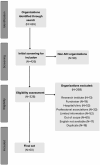Priorities and opportunities for advocacy in SCI: An international web-based review
- PMID: 38976887
- PMCID: PMC12035959
- DOI: 10.1080/10790268.2024.2369736
Priorities and opportunities for advocacy in SCI: An international web-based review
Abstract
Context: For the growing number of people with spinal cord injuries worldwide, advocacy organizations are an invaluable resource of information and education during recovery and rehabilitation.
Objective: To examine the structure, information, and accessibility of websites from international organizations that serve and advocate for individuals with SCI.
Methods: We performed a content analysis of information available from SCI organizations returned from a Google search. We used search terms relevant to SCI and advocacy and applied them to top-level domains for the G20 countries. Organizations that provide services or advocate for people with SCI with English-language websites were included; organizations focused on research, fundraising, clinical care, interprofessional knowledge exchange, or other neurological conditions were excluded. Accessibility, in terms of ease of use to information about participation, was assessed using a 3-point scale.
Results: We identified SCI organizations from 27 different countries across six regions: Africa (N = 4), Asia (N = 5), Europe (N = 27), Middle East (N = 1), North America (N = 12), and Oceania (N = 11). Across these, six categories of resources and services are covered: (1) education, (2) physical health, (3) external, (4) peer support, (5) mental health, and (6) financial and legal. Eleven organizations indicate specific engagement with research or clinical trials. Four websites provided highly accessible information (rank = 3) about participation in research.
Conclusion: The SCI organizations identified in this study offer resources that largely pertain to education and physical health services and strategies. Information about clinical trials and SCI research studies are easily accessible on the websites of the limited number of organizations offering avenues for participation.
Keywords: Advocacy; Community integration; International; Spinal cord injury.
Figures
Similar articles
-
Health professionals' experience of teamwork education in acute hospital settings: a systematic review of qualitative literature.JBI Database System Rev Implement Rep. 2016 Apr;14(4):96-137. doi: 10.11124/JBISRIR-2016-1843. JBI Database System Rev Implement Rep. 2016. PMID: 27532314
-
Interventions for preventing and reducing the use of physical restraints for older people in all long-term care settings.Cochrane Database Syst Rev. 2023 Jul 28;7(7):CD007546. doi: 10.1002/14651858.CD007546.pub3. Cochrane Database Syst Rev. 2023. PMID: 37500094 Free PMC article.
-
Drugs for preventing postoperative nausea and vomiting in adults after general anaesthesia: a network meta-analysis.Cochrane Database Syst Rev. 2020 Oct 19;10(10):CD012859. doi: 10.1002/14651858.CD012859.pub2. Cochrane Database Syst Rev. 2020. PMID: 33075160 Free PMC article.
-
Technological aids for the rehabilitation of memory and executive functioning in children and adolescents with acquired brain injury.Cochrane Database Syst Rev. 2016 Jul 1;7(7):CD011020. doi: 10.1002/14651858.CD011020.pub2. Cochrane Database Syst Rev. 2016. PMID: 27364851 Free PMC article.
-
Interventions for preventing and reducing the use of physical restraints of older people in general hospital settings.Cochrane Database Syst Rev. 2022 Aug 25;8(8):CD012476. doi: 10.1002/14651858.CD012476.pub2. Cochrane Database Syst Rev. 2022. PMID: 36004796 Free PMC article.
References
-
- World Health Organization . Spinal cord injury. World Health Organization; 2013 Nov 19 [accessed 2024 Jan 4]. https://www.who.int/news-room/fact-sheets/detail/spinal-cord-injury.
-
- Dattilo J, Caldwell L, Lee Y, Kleiber DA.. Returning to the community with a spinal cord injury: implications for therapeutic recreation specialists. Ther Recreat J. 1998;32(1):13–26.
-
- Goodridge D, Rogers M, Klassen L, Jeffery B, Knox K, Rohatinsky N, Linassi G.. Access to health and support services: perspectives of people living with a long-term traumatic spinal cord injury in rural and urban areas. Disabil Rehabil. 2014;37(16):1401–1410. doi: 10.3109/09638288.2014.972593. - DOI - PubMed
Publication types
MeSH terms
LinkOut - more resources
Full Text Sources
Other Literature Sources
Medical



